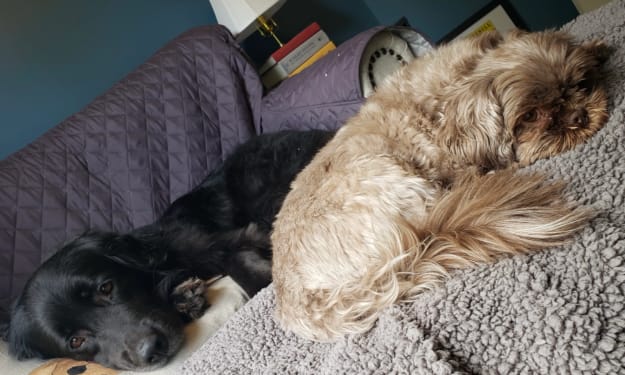Major Depression & Mental Health Care: My Experience
It’s hard to imagine unless you’re there.

It feels like defeat putting this on my own page. But I have nowhere else for it. Perhaps I should have destroyed it. You be the judge.
I. Desperation
Imagine you’re walking into your local hospital E.R. It’s early December, there’s about an inch of snow on the ground and you hold your waist-length coat tight as the wind kicks up: reminding you of the cold you feel down to your bones and soul year-round, season after season. Winter is consistently the worst season for you.
As you enter the E.R. doors, it feels like your heart won’t slow down. You irrationally wonder whether something’s going to explode: you can hear it in your ears.
Thump... Thump... Thump, thump, thump thumpthumpthumpthumpthump.
Your stomach feels like cast iron; absolutely nothing moves in your GI tract when you’re having an attack. Your adrenaline pumps like a fire hose at full blast. Your hands shake uncontrollably.
You feel claustrophobic no matter the architectural design or amount of open space around you. Any room you are in feels like a coffin: dank, without hope, the walls closing in and the roof being nailed shut over you.
You have thoughts of suicide and dying most every day. Most days you have the presence of mind to use a technique from Cognitive Behavioral Therapy (CBT) in recognizing these thoughts as just irrational and fleeting: you can control them, and the first step is realizing that is all they are. They WILL go away, in time.
CBT is not an option here. Not today. You are under assault biologically. Your normal, logical defenses are crippled. You don’t reckon time correctly when under these conditions. You can’t. Nobody can.
The thoughts wear you down even further:
What would a 9 mm taste like? Would there be any pain if the bullet cut right through your brainstem? How would you guarantee the accuracy of its flight path? Go with a rifle instead? That opens up a whole other bag of logistical worms one must be deal with like stabilizing the weapon in other ways WHILE pulling that trigger.
What about a simple hanging? That involves calculating a correct “deadman’s drop” where your neck is snapped immediately. Otherwise you will swing there writhing in pain from the noose for far too long. Of course, the correct “deadman’s equation” is up for debate as far as you know; this also hasn’t yet factored in the correct height of the drop or whether the medium you’ll fashion the noose from is sufficient to hold your weight at all.
What about going the way of slit wrists and a slit throat? The thoughts of bleeding out are much more pleasant than a slug through the head or a potentially botched hanging in a garage. Slitting your carotid artery ear to ear would take care of the problem of not slitting your wrists the correct way: down the entire length of the arm.
Most of all what would the nothingness feel like? Tar smothering you to near asphyxia, like now? Or velvet warmth, lasting to a point you absolutely cannot comprehend: eternity?
Will you even be able to conceive of darkness, of nothingness on the other side?
You do your best to apply that CBT technique while you’re waiting in the waiting room. You told them you’re here for the anxiety. That’s all. No suicidal thoughts. No homicidal thoughts (a part that is true now and has always been true). As you sit down it comes back to your consciousness that none of these thoughts are acceptable because they all involve someone in your family or a friend finding your body.
Having seen the effects first hand when your closest high school friend ate a round from a shotgun, you don’t want anyone you care about from having to see the effects of your suicide. The idea of that is unacceptable when you’ve lived through. Then the thought hits that you could drown yourself in the nearby river: that would solve the problem. Down pills and whiskey first.
Still it doesn’t do a damn thing to stop the thoughts or this pain that reaches down to your existential core; not tonight, and usually not ever. The nurses finally get you for triage, and even though you look horrible and had been crying (another thing you cannot help during an attack), they don’t bother to press you further when you jump through the hoops:
“No, no homicidal thoughts.” (truth)
“No, no suicidal thoughts.” (manifest untruth)
The thoughts hit harder as your blood pressure comes out very low, to accentuate feeling like a walking corpse. Your BP is usually low but the extra meds you were told by your primary doctor to take are designed to keep it low. They are beta blockers, intended to keep the migraines you get a few times a week under control. They haven’t done a god damn thing for today’s symptoms and you tell the nurses that.
II. Searching
As they take you to a free bed — wanting to do blood tests and a urine test for a Urinary Tract Infection (why?) — you recall your previous history with the psychiatric unit here. You’ve been in-patient voluntarily 3 times, only getting somewhere with the first two when you had a shrink you liked and trusted. She talked to you and treated you like an equal; yet, she passed away two years ago, and you do NOT trust the rest of the staff at this bureaucratic shit show of a hospital. That you’re here at all shows the level of desperation you are feeling with this attack today.
All going back to the psych unit would do is translate to another round of SSRI anti-depressants which don’t do a fucking thing to help you, take over two weeks to do anything at all in your body, and sometimes (a few times with the ones you’ve tried) translate into INCREASED major depression and suicidal ideation in people (at least, initially).
This is the state of mental health care in much of the United States today. I share my train of psychological association after going to the E.R. just a day before this writing, in this fashion because I believe most people — as warm-hearted as they are — truly do not get the nature of diseases like Major Depression and Generalized Anxiety Disorder, two things I and so many others live with daily. This is also the only way, I believe, people will begin to understand this scourge. People with the disease need to tell their stories without fear of what other people think.
The state of medicine on major depressive disorder is truly abysmal. All most first-line treatments did for me was make me sick (a few had me in bed with a migraine for days) to the point of having to be put on a very high-powered opiate (Dilaudid, about 8 times the strength of Morphine) just to handle the pain going off the anti-depressant had me in.
A separate instance with a separate anti-depressant had me in an anxiety state that was so bad that I had to call my parents who were out of state to come get me because I did not trust myself. This is not just me, this is countless others.
As you sit for hours in the bed, the nurses check on you every once in a while. They seem nice, but rushed — overworked and understaffed as nurses tend to be. You contemplate that psychiatric history further and the lack of scientific rigor (manifested especially in direct to consumer advertisements for these drugs) in the serotonin theory of depression: that a serotonin imbalance causes depression. It does in some people (which is why you see SSRI’s, which target serotonin, work in some people), but it also can cause a whole host of phenomena not at all associated with depression.
Drugs designed to raise serotonin can also at times worsen suicidal ideation. It was for this reason that the FDA required a black box warning to that effect on anti-depressants in 2004. Not to mention the fact that one study found that these drugs only work about 60% of the time.
III. Expertise?
The doctor finally arrives. He’s never seen you before but seems like a pleasant enough fellow. You go along with his physical exam. He winks at you when you tell him you don’t know your usual blood pressure but you think it trends low. Then he says, let’s get some fluids in you and discuss the anxiety problem.
You reluctantly agree although this doesn’t do a damn thing about your present problem. As they tap the IV in your right arm you think further about why we don’t yet have a real cure or even sufficient access to a palliative for this kind of thing.
Your mind then drifts to the ketamine IV infusion treatments you’ve been getting down at the closest major city to you, for your depression and weekly migraines (as ketamine is a dissociative anesthetic). They offer it here as well, but in a modified form: esketamine, a nasal spray, which must be taken under a doctor’s supervision and will only be prescribed in conjunction with a conventional anti-depressant.
You’ve already seen the manifest bad that conventional anti-depressants have caused you; so, that is an automatic disqualifier, not to mention being under the care of doctors you have ZERO trust in.
Your times under ketamine have been pleasant. The doctor never gives you a fully anesthetic dose of ketamine. Depression doses are always sub-anesthetic. This usually avoids symptoms like hallucinations. You usually experience heightened senses in conjunction with a sense of disconnection from yourself. For this, you usually bring music and reading material and it’s over in about an hour. You get to go home that same day, with a driver, of course.
Ketamine is showing incredible promise as an effective and immediate way to treat major (and treatment-resistant) depression. Many who are in an acute state of major depression with suicidal ideation (like the state you are in now) have shown a complete cessation of symptoms within HOURS, not DAYS, WEEKS, or MONTHS.
The science behind this, as far as we can tell this far is two-fold. First, because ketamine’s nature is as a dissociative anesthetic, it literally dissociates pain receptors from the body’s nervous system for a time. What this could mean for depression is that the areas of the brain responsible for physical pain are ALSO responsible for emotional pain. If true, this is a revolutionary finding.
Second, when ketamine leaves the body, it promotes the regrowth of a neurotransmitter called glutamate that depression decimates. So, ketamine’s anti-depressive effects last beyond its administration. We are only beginning to understand all this.
So why this hospital visit? Depression is a fickle disease. It can reappear in an intense form randomly. It does not disprove the ketamine one bit. You still have 3 more treatments to go.
IV. Hope?
After the fluids finish, you tell the nurses that the anxiety is still there. After asking for something 4 times you finally get it: a half a dose of an anti-histamine called Vistaril. You think, ‘you idiots couldn’t give me this BEFORE starting the IV? Or maybe looked at my damn chart which I’m pretty sure says it’s never worked for me before?’
You haven’t been to this hospital for anxiety in at least five years, it shouldn’t have been a problem to get a med that actually does the damn job of helping you through this attack. Swilling Gatorade and taking 2 Benadryl at home would do the same exact thing.
You leave, vowing to never return to this hell hole. You feel a bit better, however, thinking at least you have your next ketamine treatment which will help. Then that elation turns back to sorrow as you think of how God awful our mental health care system is if this place is any reflection, and just how many people are suffering needlessly.

NOTE: The author is not a medical professional. These are merely his observations during a hospital visit. If you or a loved one are experiencing suicidal thoughts, call the suicide hotline: 800-273-8255.
Thanks for reading! Journalist and dogged student of all things forensic, Wess Haubrich, examines the nitty, gritty details you didn't know about famous (and not so famous but equally weird) crimes and their unseen motivations.
You can also support the Real Monsters' podcast Wess does to get even deeper into these cases. Find it wherever you get your podcasts or here:
http://www.realmonsters.com/live
Tip Wess on Vocal Media.
We can't go forward without you! Make a donation to keep the podcast running at any of these links:
https://www.paypal.com/donate?hosted_button_id=WLPEMHK7SH43Y https://www.patreon.com/realmonsters
https://www.buymeacoff.ee/realmonster
http://www.cash.app/$RMPodcast
https://www.givebutter.com/realmonsters
We are also on Venmo! (message us for further details)
Follow the Show on Facebook here and Twitter here. We're also on Instagram and Snapchat. Follow Wess on Twitter here.
#crime #truecrimepodcast #history #justice #mentalhealth
About the Creator
Real Monsters
Covering the macabre, weird, abberational, and criminal. Catch the podcast on your favorite service today, or head to:
http://www.realmonsters.live






Comments
There are no comments for this story
Be the first to respond and start the conversation.